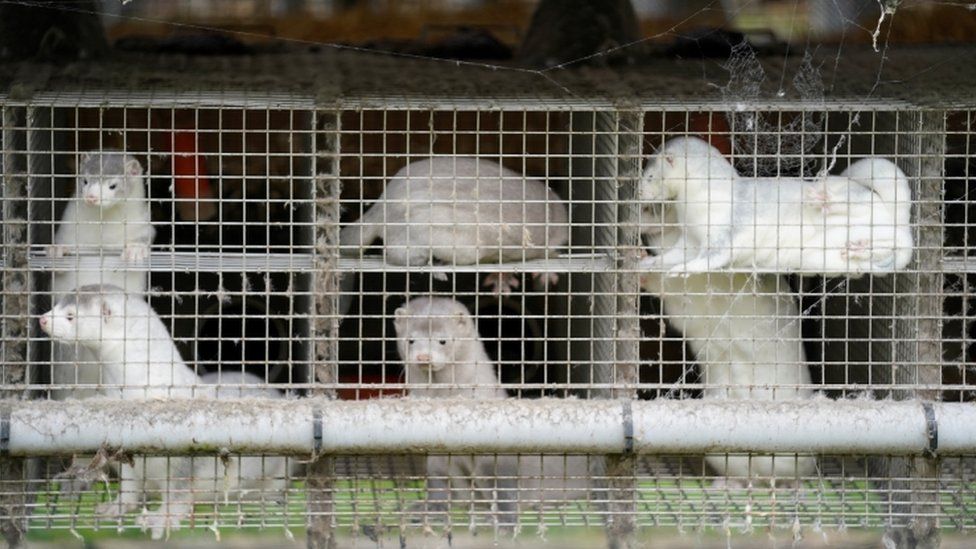Denmark to cull up to 17 million mink amid coronavirus fears
-
Published

Denmark will cull all its mink - as many as 17 million - after a mutated form of coronavirus that can spread to humans was found on mink farms.
Prime Minister Mette Frederiksen said the mutated virus posed a "risk to the effectiveness" of a future Covid-19 vaccine.
Denmark is the world's biggest producer of mink fur and its main export markets are China and Hong Kong.
The culling began late last month, after many mink cases were detected.
Warning: you may find a picture of dead mink lower down disturbing
Coronavirus cases have also been detected in farmed mink in the Netherlands and Spain since the pandemic began in Europe.
But cases are spreading fast in Denmark - 207 mink farms in Jutland are affected - and at least five cases of the new virus strain were found. Twelve people had become infected, the authorities said.
Prime Minister Frederiksen described the situation as "very, very serious". Danish police and army personnel will help to carry out the mass cull.
Ms Frederiksen cited a government report which said the mutated virus had been found to weaken the body's ability to form antibodies, potentially making the current vaccines under development for Covid-19 ineffective.
"We have a great responsibility towards our own population, but with the mutation that has now been found, we have an even greater responsibility for the rest of the world as well," she told a news conference.
Since the start of the pandemic Denmark has reported 52,265 human cases of Covid-19 and 733 deaths, data from Johns Hopkins University shows.
Mink virus might jeopardise vaccines
By BBC Environment correspondent Helen Briggs
More than 50 million mink a year are bred for their fur, mainly in China, Denmark, the Netherlands and Poland. Outbreaks have been reported in fur farms in the Netherlands, Denmark, Spain, Sweden and the US, and millions of animals have had to be culled.
Mink, like their close relatives ferrets, are known to be susceptible to coronavirus, and like humans, they can show a range of symptoms, from no signs of illness at all, to severe problems, such as pneumonia.
Mink become infected through catching the virus from humans. But genetic detective work has shown that in a small number of cases, in the Netherlands and now Denmark, the virus seems to have passed the other way, from mink to humans.
The big public health concern is that any mutation to the coronavirus as it passes between mink and humans might be enough to stop human vaccines working, if and when they become available. Some scientists are now calling for a complete ban on mink production, saying it impedes our response and recovery from the pandemic.
Mink at more than 1,000 Danish farms are to be culled. The World Health Organization says it is discussing the outbreak with the Danish authorities.
Spain culled 100,000 mink in July after cases were detected at a farm in Aragón province, and tens of thousands of the animals were slaughtered in the Netherlands following outbreaks on farms there.
Studies are under way to find out how and why mink have been able to catch and spread the infection.
Critics and supporters of the fur trade speak out
- A SIMPLE GUIDE: How do I protect myself?
- IMPACT: What the virus does to the body
- ENDGAME: How do we get out of this mess?
- WITHOUT SYMPTOMS: The mystery of 'silent spreaders'
-
-
Published17 July 2020
-
-
-
Published3 June 2018
-
-
-
Published5 May 2020
-